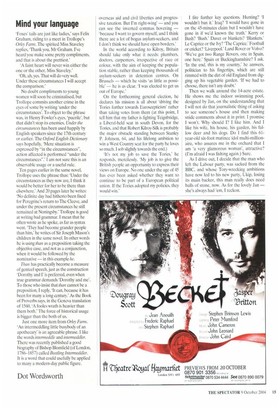Mind your language
'Foxes' tails are just like ladies,' says Felix Graham, riding to a meet in Trollope's Orley Farm. The spirited Miss Staveley replies, 'Thank you, Mr Graham. I've heard you make some pretty compliments, and that is about the prettiest.'
.A faint heart will never win either the one or the other, Miss Staveley.'
'Oh, ah, yes. That will do very well. Under these circumstances I will accept the comparison.'
No doubt compliments to young women will soon be criminalised, but Trollope commits another crime in the eyes of some by writing 'under the circumstances'. To object to the phrase was, in Henry Fowler's eyes, 'puerile', but that didn't stop its enemies. Under the circumstances has been used happily by English speakers since the 17th century or earlier. The Oxford English Dictionary says hopefully, 'Mere situation is expressed by "in the circumstances", action affected is performed "under the circumstances": I am not sure this is an observable usage or a useful rule.
Ten pages earlier in the same novel, Trollope uses the phrase thus: 'Under the circumstances as they now are, I think it would be better for her to be there than elsewhere,' And 20 pages later he writes: 'No definite day had hitherto been fixed for Peregrine's return to The Cleeve, and under the present circumstances he still remained at Noningsby: Trollope is good at writing bad granular. I mean that he often wrote as he spoke, as far as syntax went. 'They had become grander people than him,' he writes of Sir Joseph Mason's children in the same novel. In other words he is using than as a preposition taking the objective case, and not as a conjunction, when it would be followed by the nominative — in this example he.
Than has practically become a measure of genteel speech, just as the construction 'Dorothy and is preferred, even when true grammar demands 'Dorothy and me'. To those who insist that than cannot be a preposition, I reply, 'It can, because it has been for many a long century.' As the Book of Proverbs says, in the Geneva translation of 1560, 'A fooles wrath is heavier than them both.' The force of historical usage is bigger than the both of us.
Just one more item from Orley Farm. 'An intermeddling little busybody of an apothecary' is an agreeable phrase. I like the words intenneddle and intetmeddler. There was recently published a good biography of Bishop Blomfield (of London, 1786-1857) called Bustling Intenneddler. It is a word that could usefully be applied to many a modern-day public figure.
Dot Wordsworth


















































































































 Previous page
Previous page